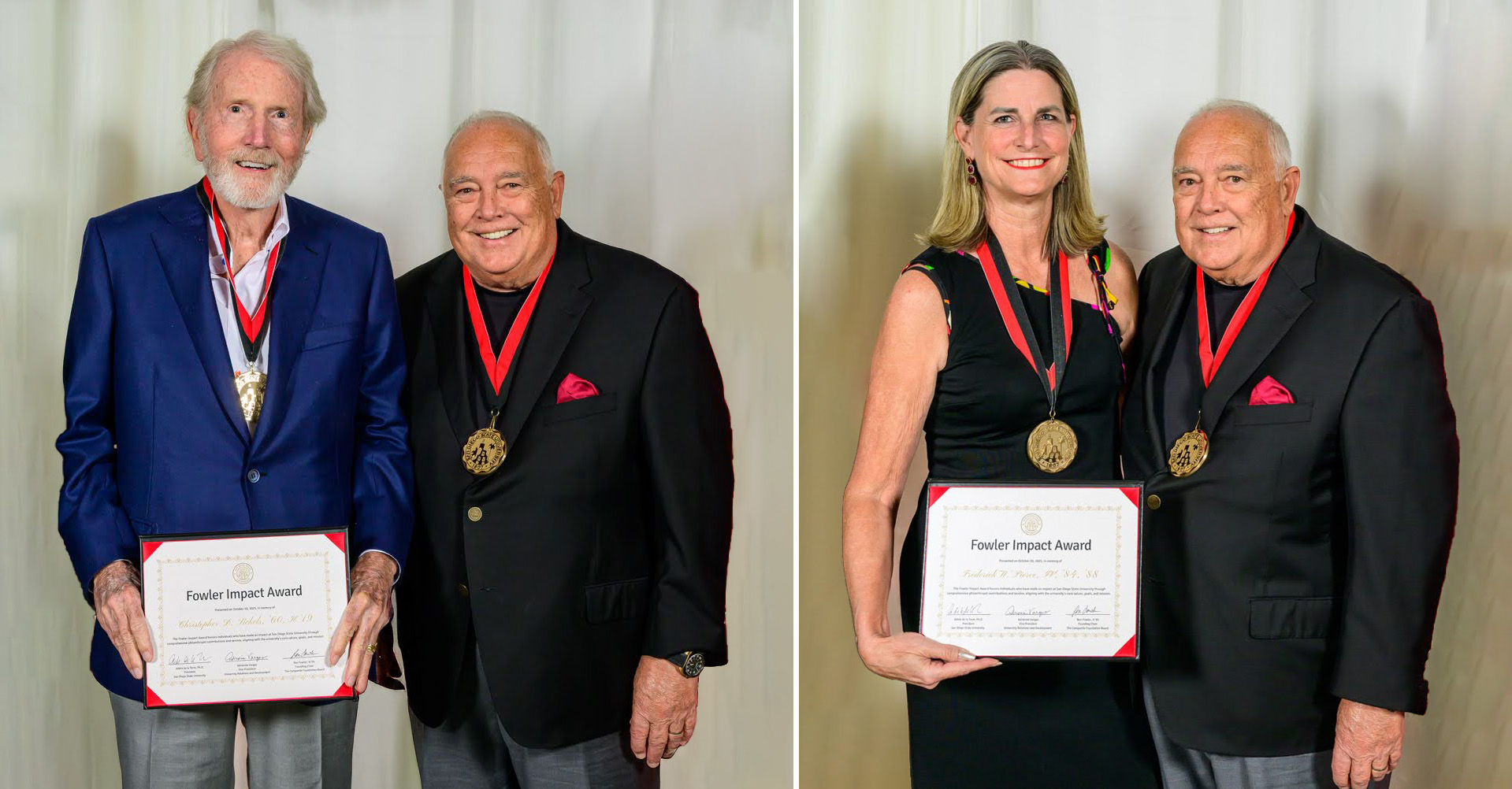Why I Tell My Story
Josh Morse chronicles his incredible journey from homelessness to head of Associated Students.
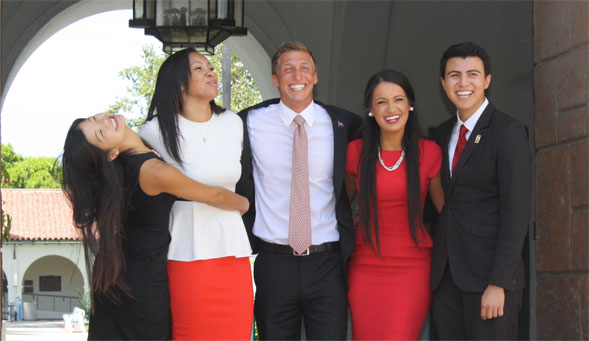
Less than a month into his new gig as president of SDSU Associated Students, Josh Morse finds himself posing for AS website photos with his fellow executive officers in front of Hepner Hall. With a suit and tie accentuating his cover-boy good looks, he appears every bit the clothing model or the head of a multi-million-dollar corporation — both of which he is.
But until relatively recently, Montezuma Mesa was never somewhere Morse expected to be; or for that matter, any other university campus.
“College isn't something I was planning on,” says the 21-year-old senior finance major. “Just like all my other friends, I thought I was just going to get a job and work the rest of my life.”
Looking back, it’s easy to understand why Morse never thought he had much to look forward to.
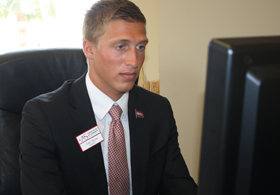
Morse works at the computer in his Associated Students office.
“When someone says, 'How was your childhood,' in my head I go, 'How do I respond to that question?'” Morse explains. “I didn't have a childhood.”
Abandoned and alone
Morse was five when his abusive father, who battled addiction, abandoned the family. It wasn’t long before his mother, struggling with issues of her own including runs-ins with the law, found herself falling farther and farther behind in her efforts to take care of Josh and his two sisters, Katie, who is older, and Sarah who is younger.
The family lost their home. They would stay with friends or in their car and as finances grew worse, in a tent in canyons throughout San Diego. With the family having no phone or permanent address, it became almost impossible for distant relatives to locate them. Sometimes even Morse would lose track of his mom and the girls.
“I was ten years old and I would come back to where we were staying that night before and my mom and my sisters were gone,” he remembers. “It's eleven o'clock at night. I just took three different transit lines to get here. I had come from Dana Elementary School, which is in Point Loma, all the way to Mission Gorge and then my mom wouldn't be there. Where do you go?
“At eleven o'clock at night the transit system stops, so sometimes I would just hunker down next to a bush and pass out, wake up in the morning, get back on the bus and go to school again. It was to a point where I was so upset and emotionally exhausted I was, like, 'I cannot take this anymore.'”
The darkest moment
Out of desperation, Morse made the toughest decision of his young life.
“I said bye to my sisters and packed up my backpack and my skateboard, got my bike and rode away. You have no choice (but to make the decision). It was either sink or swim. I didn't know what else out there would be better, but I knew I could take care of myself better than my mom could.
“I mean, we were living in a tent in a canyon and going to sleep hungry. That sucks. But it was the hardest thing to make the decision to leave. I knew I was a tough kid and I was going to survive because I had the will to, but where were my sisters going to go?
“I had to turn off all my emotion and say, 'I'm going to be selfish and think about myself and run away and leave my sisters here.’ That was my darkest moment because I felt like I had abandoned my family and I knew what abandonment felt like, so for me to turn around and do that to someone else destroyed me.”
A moral compass
On his own, he crashed with friends and relatives. He stayed in school, but spent the majority of his free time at skate parks perfecting his board skills. Hanging out with an older crowd, he developed less acceptable skills as well.
"Stealing food was just one thing we used to do,” Morse recalls. “It wasn't like a daily thing, but I was used to it. And what my friends would do — I didn't do it — was check door handles of cars, so if the car was unlocked, whatever was in it was gone. The kids I was with were stealing iPods and stuff like that and I knew it was wrong.
On a skate trip to Palm Springs, Morse fell and broke his wrist. There was no money for medical care and no parent or guardian to authorize it. A friend’s parent brought him back to San Diego to the house of a relative who paid for his treatment and provided a place to stay for a while, but it was not a permanent solution.
Jackpot
Then an Ocean Beach couple, Craig and Julie Klein, got wind of Josh’s situation. It turned out to be the biggest break of his life.
“They said, 'We'll let him stay here for the weekend' and that weekend turned into seven years,” Morse says. “So I definitely hit the jackpot.”
At the time, the Kleins’ only child, Jenna (’08), had gone off to school at SDSU. They had room to spare and "it just seemed like the right thing to do,” Craig Klein explains. The family knew Morse from his exploits as a skateboarder.
“At like 11, Josh was one of the best skateboarders his age in all of San Diego,” says Klein, a surfer himself. “He was a real standout and if you were skating at the skate park you couldn't help but notice him.
"We told him the main rule if he was going to move in was he was going to have to learn how to surf and to surf well, which turned out to be not very difficult at all.
A room, a bed and dinner time
Things just seemed to click between Morse and the Kleins.
“I was never able to be a kid until I was in the Klein family," Morse says. “They gave me stability.
“For the first time I had a dinner time; 'Come home for dinner.' We had family night on Sunday and I had my own room for the first time ever. I had my own bed. I was like, 'Wow, this is unreal.'
“And so I thought, 'Do not blow it. Do not mess this up.' So I stopped hanging out with all of my friends who were doing the drugs and hanging out and I focused on my academics and I got into surfing and that was kind of like my escape.”
Morse became captain of his high school surf team and was active as a student leader.
“After he was elected by acclamation as senior class president at Point Loma High, we sort of became used to the idea that he was going to do great things,” says Klein who, along with Julie, became Morse’s guardian. “He's just an amazingly gifted individual - a wonderful, warm, genuine person.
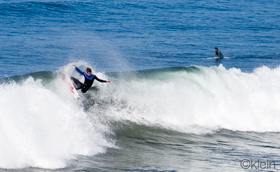
Morse switched from skateboarding to surfing after moving in with the Kleins and became captain of his high school surf team, then captain of the SDSU surf team. "And not only is he an incredibly talented athlete, but he is an incredibly talented musician. All through high school he played drums in the band. But beyond just drums (and alto saxophone and ukulele), he can sit down at a piano and just start improvising and amazing stuff comes out. It seems like everything he touches turns to gold.
“With Josh, we feel like we won the ‘son sweepstakes.’ We are lucky to have him as part of the family."
The feeling is mutual. "If I could have created a family that I wanted to live with, I couldn't have made a better family," Morse says.
Like everyone else
Morse studied hard, earned several scholarships, and when it came time to choose a college he picked SDSU. The main reason, he says, was the university’s Guardian Scholars Program, designed to help young people make the transition from foster care into college life.
“It’s a part of the university that was made for people like me,” says Morse, who was never a part of the foster care system, but still qualifies for the program. “I constantly had to hide who I was. I didn't want my friends to know I was struggling, that my mom couldn't provide for us, that I would wear the same clothes to school. I wanted to pretend I was like everyone else. So finally when I found out there were other students who have struggled even harder than I have, but who have been so resilient and were able to get to college, that's where I wanted to be.”Reggie Blaylock (’88, ’06, ’10), Ed.D, is associate vice president of student services at SDSU and a founder and chief advocate of the Guardian Scholars Program. He has served as a mentor to Morse since the summer of 2010.
“I think we knew right from the beginning of his experience there was something special about Josh,” he says. “Something genuine and something unique.
“Josh has cared about people other than himself since the time he arrived on campus and really, it was in him before he got to us. He came out of high school into our Summer Bridge Program and spent five weeks with 175 kids he didn’t know — any of them — and those student leaders voted for him to receive the vice president’s leadership award.”
In great hands
And that was only the beginning. Morse involved himself in student government, is a Sigma Phi Epsilon fraternity member and joined the UCLA Law Fellows Program to help him prepare should he decide to pursue a law career.
He also became captain of the SDSU surf team. Talented enough at the sport to attract sponsors who provide him gear and clothing which he has modeled, he was recently featured in a surfing magazine.
Is it any wonder that this past semester he was elected Associated Students president? Morse still seems slightly incredulous that he’s now head of an independent student-directed non-profit corporation with a $20 million dollar annual operating budget.
“When I won (the election) it was very surreal to me to become president,” he marvels. “Finally, it's like I made it.
“Now I have a chance to help that many more people on a larger scale. I'm just very grateful to be here and very grateful for this opportunity to serve SDSU and to be a part of the history here.
“SDSU has given me everything, literally. It's given me the motivation and the drive to succeed. People here are changing lives and I’m an example of that. I'm thankful to SDSU because I know I'm in great hands, as are other students like me, and that's why I tell my story.”
Full circle
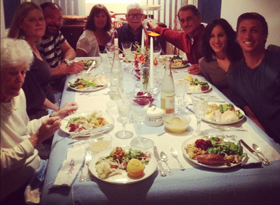
Morse (right) celebrates Thanksgiving with the Klein family.
Morse’s story is still being written. Will its ensuing chapters include a career in politics, law or finance?
“I have no idea what's going to lead me down the path,” he admits, “but it would have to be helping people.”
Morse still keeps in touch with his family, including his mother. He recently learned that the father he had not seen since childhood had died, leaving no hope of any kind of reconciliation.
Katie and Sarah live out of state. Katie has a baby of her own. For the most part, the siblings have put the unpleasantness of their childhood behind them.
“It doesn't matter what happened in my past,” Morse says. “How can I make someone else's life better? That's why I chose leadership and I think that's why I do what I do. I want to truly make a difference.
“I describe myself as bringing it full circle. The next me is sitting in a crowd of students and he doesn't know what he's doing here or how he got here, but he's here now and I'm going to push him in his right direction. Hopefully, he'll pick his passion and whatever that passion is he'll make an impact."
Just like a homeless kid whose journey has led from a camp in a canyon to SDSU.

